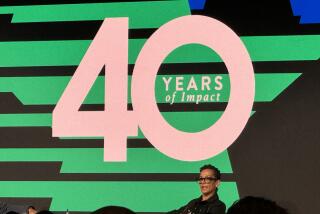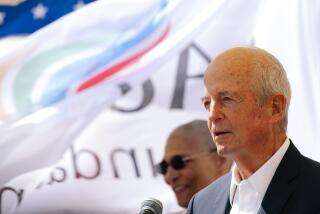Hells Angel Fulfills Olympic Goal : Biker Says He’s Satisfied With Pact on Funds for Children
- Share via
Hells Angel George (Gus) Christie Jr. said he is satisfied at last that mentally retarded children in Pottstown, Pa., will get the aid he intended when he raised $3,000 from fellow bikers and ran in the 1984 Olympic Torch Relay.
Christie, 42, president of the Hells Angels in Ventura County, confirmed that a confidential settlement has been reached in a lawsuit he filed four years ago over how the money he raised should be distributed.
“I’m bound by the court not to discuss the agreement,” Christie said in a telephone interview Monday. “Obviously, if I felt the best interests of the children weren’t served by settling this out of court, I wouldn’t have agreed to the terms.”
Joe Valerio, director of the Montgomery County Special Olympics, which oversees distribution of funds to local chapters in the county, told The Times that the group received $3,000 from the Los Angeles Olympic Organizing Committee in April. He said the Special Olympics chapter in Pottstown that Christie favored will get “whatever they need.”
That was Christie’s stated goal when he filed suit in April, 1985, against the Olympic Organizing Committee and Special Olympics International, a charity that provides sports training for mentally retarded adults and children age 8 and older.
As a Ventura County participant in the 15,000-mile torch relay--he ran a kilometer to the cheers of fellow bikers from the Hells Angels, Crucifiers and Heathens motorcycle chapters--Christie was asked to name a youth organization to receive the money he had paid.
He chose the Special Olympics group in Pottstown, an industrial community of about 25,000 outside Philadelphia, because of letters he had received from residents who read about him in media accounts.
Months after the torch relay, Christie’s $3,000 had not arrived in Pottstown. He received a letter from Eunice Kennedy Shriver, chairwoman of Special Olympics, who explained that the organization’s policy was to divide donations between its Washington, D.C., headquarters and state chapters, not local chapters.
The dissatisfied Christie filed suit in Los Angeles Superior Court soon afterward, but his efforts to pursue the case were complicated by his own legal troubles in Los Angeles federal court, where he was tried and acquitted in 1987 on a charge of soliciting the murder of a government informant.
During the trial, his lawyers argued that federal authorities brought charges against Christie after he gained national attention in the Olympic Torch Relay and then used it as a forum to criticize law enforcement officials for the alleged harassment of the Hells Angels.
“I’m satisfied now,” Christie said Monday. “I just wish it hadn’t taken this long.”
More to Read
Go beyond the scoreboard
Get the latest on L.A.'s teams in the daily Sports Report newsletter.
You may occasionally receive promotional content from the Los Angeles Times.






